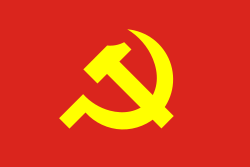 Flag of the Communist Party of Vietnam | |
| Date | 20–28 January 2016 |
|---|---|
| Location | Vietnam National Convention Center, Nam Từ Liêm District, Hanoi |
| Participants | 1,510 |
| Outcome | The election of the 12th Central Committee |
The 12th National Congress of the Communist Party of Vietnam (Vietnamese: Đại hội đại biểu toàn quốc lần thứ XII, 12th National Congress of Delegates) was the twelfth party congress of the Communist Party of Vietnam that was held at the My Dinh National Convention Centre, Hanoi.[1] The party convened on January 18, 2016 and lasted until January 20. The Congress elected the 200-member Party Central Committee, composed of 180 official members and 20 alternate members.[clarification needed]
The new committee then elected 19 members of the Central Politburo and the Central Committee in the First Plenary Session of the 12th Central Committee, which included four key government positions: Nguyễn Phú Trọng was re-elected as General Secretary—the head of the Politburo, Trần Đại Quang was nominated as the President of Vietnam—the head of the state and ranked second in the Politburo, Nguyễn Xuân Phúc was elected as the Prime Minister—the head of the government and ranked third in the Politburo, and Nguyễn Thị Kim Ngân was elected as Chairwoman of the National Assembly of Vietnam—the legislative speaker of National assembly, ranked fourth in the Politburo.
The 12th National Congress of the Communist Party of Vietnam included an assessment of the country's national leadership and development that had occurred over the past 30 years of reform. At the same time, the party evaluated the implementation of the 11th National Congress' policies from 2011 to 2015, and set new policies to be implemented over the period from 2016 to 2020. The Doi Moi economic reforms have benefited Vietnam's society, resulting in an ongoing transformation of the state. Vietnam experienced a shift regarding the basis of regime legitimacy, with a change from nationalism and socialist ideology to performance, as well as a shift towards a diversified foreign policy through strategic partnerships and economic cooperation.[2]
- ^ Vietnam's prime minister still retains a slim chance of challenging his rival, the ruling communist party chief, for the top job YVES DAM VAN, U.S. News Jan. 21, 2016, at 11:37 p.m.
- ^ Thayer, Carlyle A. (2017). Vietnam's Foreign Policy in an Era of Rising SinoUS Competition and Increasing Domestic Political Influence. Asian Security. p. 183.
